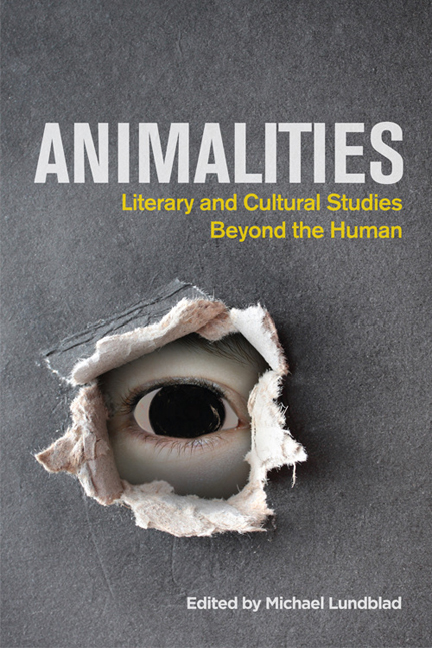Book contents
- Frontmatter
- Contents
- List of Figures
- Acknowledgments
- Introduction: The End of the Animal – Literary and Cultural Animalities
- 1 Each Time Unique: The Poetics of Extinction
- 2 Posthuman New York: Ground Zero of the Anthropocene
- 3 J. G. Ballard's Dark Ecologies: Unsettling Nature, Animals, and Literary Tropes
- 4 Staging Humanimality: Patricia Piccinini and a Genealogy of Species Intermingling
- 5 “Sparks Would Fly”: Electricity and the Spectacle of Animality
- 6 The Nature of Birds, Women, and Cancer: Terry Tempest Williams's Refuge and When Women Were Birds
- 7 Animality, Biopolitics, and Umwelt in Amitav Ghosh's The Hungry Tide
- 8 Looking the Beast in the Eye: Re-animating Meat in Nordic and British Food Culture
- 9 Love Triangle with Dog: Whym Chow, the “Michael Fields,” and the Poetic Potential of Human-Animal Bonds
- 10 Bestial Humans and Sexual Animals: Zoophilia in Law and Literature
- Notes on Contributors
- Index
3 - J. G. Ballard's Dark Ecologies: Unsettling Nature, Animals, and Literary Tropes
Published online by Cambridge University Press: 07 December 2017
- Frontmatter
- Contents
- List of Figures
- Acknowledgments
- Introduction: The End of the Animal – Literary and Cultural Animalities
- 1 Each Time Unique: The Poetics of Extinction
- 2 Posthuman New York: Ground Zero of the Anthropocene
- 3 J. G. Ballard's Dark Ecologies: Unsettling Nature, Animals, and Literary Tropes
- 4 Staging Humanimality: Patricia Piccinini and a Genealogy of Species Intermingling
- 5 “Sparks Would Fly”: Electricity and the Spectacle of Animality
- 6 The Nature of Birds, Women, and Cancer: Terry Tempest Williams's Refuge and When Women Were Birds
- 7 Animality, Biopolitics, and Umwelt in Amitav Ghosh's The Hungry Tide
- 8 Looking the Beast in the Eye: Re-animating Meat in Nordic and British Food Culture
- 9 Love Triangle with Dog: Whym Chow, the “Michael Fields,” and the Poetic Potential of Human-Animal Bonds
- 10 Bestial Humans and Sexual Animals: Zoophilia in Law and Literature
- Notes on Contributors
- Index
Summary
Introduction
Between 1961 and 2009, J. G. Ballard published nearly twenty novels as well as numerous short stories. Many of them are populated with strange creatures that in different ways strain conceptions of the borders of the human and the animal. Reading through Ballard's oeuvre may leave you with an unsettling feeling of confusion or with an inspiring sense of dislocation. These works continuously challenge habitual conceptions of reality and try out different modes of approaching and understanding it as they play with the formalist borders of the mimetic, the representational, and the allegorical. Frequently, this experimentation, situated as it is in post-apocalyptic sceneries and bleak technological futures, has positioned him as a dystopian writer and as a narrator of “exhausted futures.” While many of the futures Ballard constructs are indeed rather bleak – his worlds are flooded, crystallized, dried out, covered in concrete, or populated by characters paralyzed by lives of leisure – I would like to reopen the question of what exactly is exhausted in the worlds he depicts. I wish to draw attention to two interrelated things in particular that seem exhausted in Ballard's writing – the human, and the modes of representation that it has constructed to retain its ontological and epistemic priority as such. The human no longer quite recognizes itself as such in his books. While this repeatedly makes for unsettling character portrayals, it also opens for an interrogation of the means by which literary tropes have policed the borders of the human and the nonhuman.
Ballard is well known for his explorations of human boundaries – the boundaries of sexuality, the boundaries of the psyche, the boundaries of technology. In what follows, I will argue that he not only explores such boundaries but that he also challenges the conceptualizations and epistemological systems of such boundaries in the first place. Such challenges have been and continue to be made in various ways in both animality studies and posthumanist research as we can see, for example in Michael Lundblad's questioning of the way the representation of interspecies animal sexuality tends to be read as a substitution or displacement of forbidden human sexualities relationships or in Cary Wolfe's and many others’ interrogation of the humanist frameworks that have constructed the exceptionalism of the human subject.
- Type
- Chapter
- Information
- AnimalitiesLiterary and Cultural Studies Beyond the Human, pp. 60 - 79Publisher: Edinburgh University PressPrint publication year: 2017



